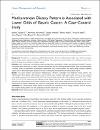Mediterranean Dietary Pattern is Associated with Lower Odds of Gastric Cancer: A Case–Control Study
| Author | Tayyem, Reema |
| Author | Al-Awwad, Narmeen |
| Author | Allehdan, Sabika |
| Author | Ajeen, Rawan |
| Author | Al-Jaberi, Tareq |
| Author | Rayyan, Yaser |
| Author | Bawadi, Hiba |
| Author | Hushki, Ahmad |
| Available date | 2022-06-20T05:03:41Z |
| Publication Date | 2022-06 |
| Publication Name | Cancer Management and Research |
| Identifier | http://dx.doi.org/10.2147/CMAR.S360468 |
| Citation | Tayyem R, Al-Awwad N, Allehdan S, Ajeen R, Al-Jaberi T, Rayyan Y, Bawadi H, Hushki A. Mediterranean Dietary Pattern is Associated with Lower Odds of Gastric Cancer: A Case–Control Study. Cancer Manag Res. 2022;14:2017-2029 https://doi.org/10.2147/CMAR.S360468 |
| ISSN | 1179-1322 |
| Abstract | Background: Diet pattern is an important modifiable lifestyle factor. However, epidemiological studies show that the association between dietary patterns and gastric cancer (GC) is conflicting. This study aims to assess the impact of several dietary choices on the risk of GC among newly diagnosed Jordanian patients. Methods: A case–control study was conducted at major oncology centers and hospitals in Jordan. Study participants included 172 patients with incident gastric cancer and 314 controls. Data was collected using interview-based questionnaires. Dietary intake was estimated using a validated Arabic and reproducible food-frequency questionnaire (FFQ). Dietary patterns were derived using Principal Component Analysis (PCA). Multinomial logistic regression was used to estimate the association between dietary patterns and GC. Results: Four dietary patterns were itemized; “Mediterranean”, “Prudent”, “Unhealthy” and “High-fruit” dietary patterns. The “Mediterranean” dietary pattern, which includes a diet rich in fresh fruits, vegetables, milk, yogurt, lentils, and olive oil was associated with a significant decrease in the odds ratio (OR) of GC for the third and fourth quartiles (OR, 0.394 (confidence interval (CI): 0.211– 0.736); 0.212 (CI: 0.107– 0.419), respectively) after adjusting for age, gender, body mass index, smoking, marital status, total energy intake, education level, and physical activity. While the “Unhealthy” and “Prudent” dietary patterns enhance the risk of developing GC, this risk was insignificant at any quartile. Additionally, the “High-Fruit” dietary pattern shows an insignificant protective effect against the risk of GC. Conclusion: The “Mediterranean” dietary pattern was associated with a reduced risk of GC among Jordanians. However, the other three identified dietary patterns were not significantly associated with the risk of GC. |
| Sponsor | The authors would like to thank Hashemite University for funding the research project (Grant number AM/16/13/10/1403938). |
| Language | en |
| Publisher | Dove Press |
| Subject | dietary patterns gastric cancer retrospective case–control study |
| Type | Article |
| Pagination | 2017-2029 |
| Volume Number | 14 |
Files in this item
This item appears in the following Collection(s)
-
Human Nutrition [425 items ]


